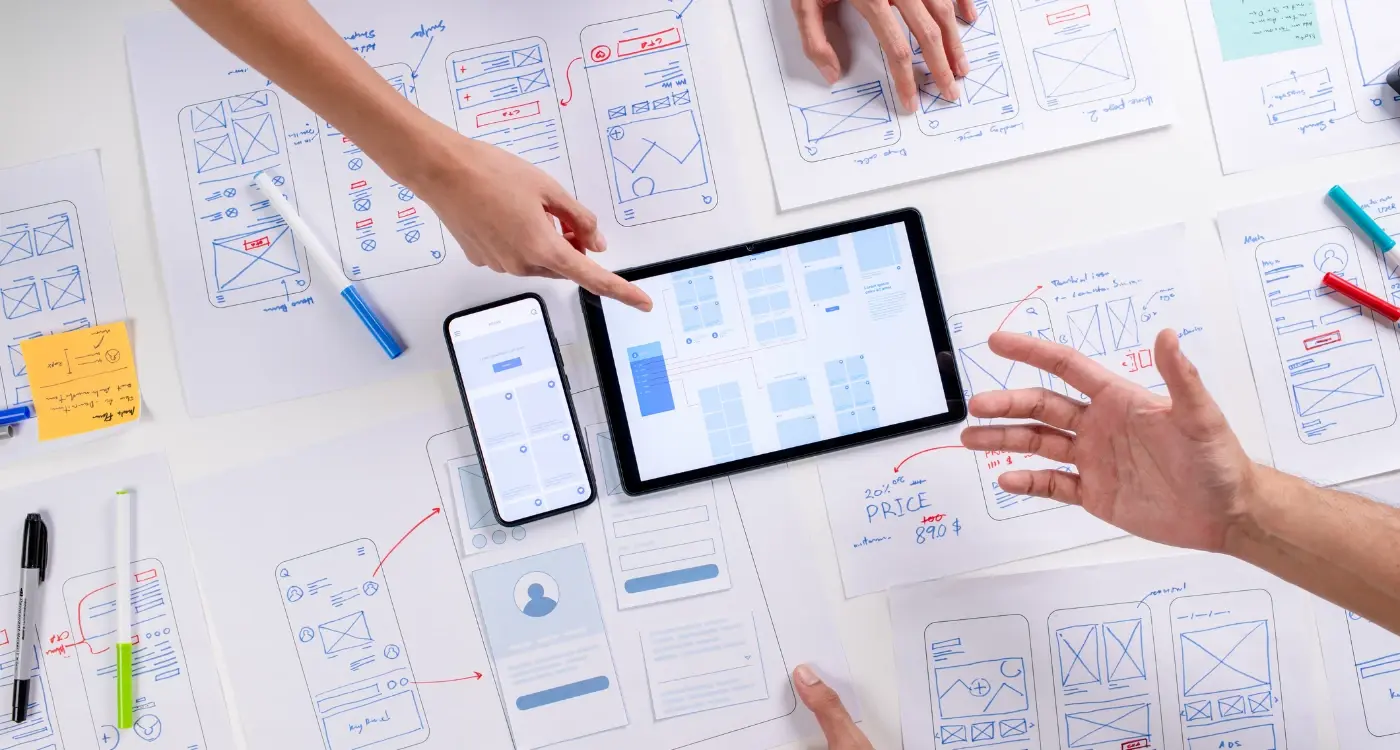Choosing the Right Enterprise App Development Partner: An Expert Guide
Over 90% of enterprise app development projects fail to meet their original objectives. That's a staggering statistic that keeps CTOs and IT directors awake at night. The problem isn't that companies lack good ideas or adequate budgets—it's that they choose the wrong development partner. When you're dealing with enterprise-scale projects, the stakes are high and the margin for error is practically zero.
Selecting an enterprise app development partner isn't like picking a freelancer for a quick website update. You're making a decision that will impact your organisation for years to come. The wrong choice can lead to budget overruns, missed deadlines, security vulnerabilities, and apps that simply don't work as intended. The right choice, however, can transform how your business operates and give you a competitive edge that lasts.
The best enterprise app development partnerships feel less like vendor relationships and more like having an extension of your internal team—one that happens to be exceptionally good at building mobile solutions
This guide will walk you through the key factors you need to evaluate when selecting your enterprise app development partner. From understanding your own requirements to assessing technical capabilities, security standards, and long-term support options, we'll cover everything you need to make an informed decision. By the end, you'll have a clear framework for your app development procurement process and the confidence to choose a partner who can deliver.
Understanding Your Enterprise App Development Needs
Before you even start looking at potential development partners, you need to get crystal clear on what you actually need. I've worked with countless enterprises over the years and the ones that succeed are always those who've done their homework first—they know exactly what they want to achieve and why.
Start by asking yourself some tough questions. What business problem are you trying to solve? Who will be using this app and how often? Will it need to integrate with your existing systems? These aren't just nice-to-have details; they're the foundation that everything else builds upon.
Key Areas to Define
- Target users and their technical skill levels
- Required integrations with current business systems
- Expected user volume and peak usage times
- Budget range and timeline expectations
- Security and compliance requirements
- Platform preferences (iOS, Android, or both)
Don't make the mistake of jumping straight into features and fancy functionality. I've seen too many projects go off the rails because nobody took time to understand the real requirements. Your development partner will ask you these questions anyway, so having clear answers ready shows you're serious and helps them give you accurate proposals.
Remember, changing requirements mid-project is expensive and time-consuming. Get this bit right and everything else becomes much easier.
Evaluating Technical Expertise and Development Capabilities
When you're putting together your app development RFP, understanding what technical skills really matter can feel overwhelming. I've seen too many enterprises get caught up in buzzword bingo—choosing partners based on who mentions the most programming languages rather than who actually knows how to use them properly.
The trick is looking beyond the surface. Any decent development team will have the basics covered, but what separates the good from the great is how they approach problem-solving and scalability. Ask potential partners about their experience with enterprise-grade challenges: handling thousands of concurrent users, integrating with legacy systems, or managing complex data synchronisation across multiple platforms.
Key Technical Areas to Assess
- Native vs cross-platform development expertise and when to use each approach
- Backend architecture experience, particularly with cloud services and APIs
- Database design and management for enterprise-scale applications
- Integration capabilities with existing enterprise systems
- Performance optimisation and load testing experience
- Code quality standards and testing methodologies
Ask candidates to walk you through a recent technical challenge they faced and how they solved it. Their explanation will reveal far more about their capabilities than any list of technologies ever could.
Remember, the best enterprise app development partners don't just code—they architect solutions that grow with your business and integrate seamlessly with your existing technology stack.
Assessing Project Management and Communication Approaches
When I'm evaluating potential development partners, I always pay close attention to how they handle project management and communication. Why? Because even the most talented developers can deliver a disappointing result if they can't manage a project properly or keep you informed along the way.
Start by asking about their project management methodology. Do they use Agile, Scrum, or Waterfall approaches? Most modern development teams favour Agile methods because they allow for flexibility and regular feedback—which is exactly what you want when building complex enterprise applications. You'll want to understand how they break down projects into manageable chunks and how often they'll show you progress.
Communication Standards Matter
Look for partners who establish clear communication protocols from day one. How often will they update you? What tools do they use for project tracking? Can you see real-time progress on your project? The best development partners I've worked with provide regular updates, maintain transparent project dashboards, and respond to queries quickly.
Meeting Your Business Needs
Don't forget to consider time zones and working hours, particularly if you're working with an offshore team. Will there be sufficient overlap for meetings and urgent discussions? A great development partner will adapt their communication style to match your business requirements—not the other way around.
Reviewing Security Standards and Compliance Requirements
When you're doing enterprise app development procurement, security isn't just a nice-to-have—it's absolutely non-negotiable. I've seen too many organisations get caught out because they didn't ask the right security questions during their app development RFP process. Your potential development partner needs to demonstrate they understand data protection laws like GDPR, industry-specific regulations, and basic security best practices.
Industry-Specific Compliance
Different industries have different rules. Healthcare apps need HIPAA compliance; financial services require PCI DSS standards; government projects often need ISO 27001 certification. Your development partner should know these requirements inside out, not learn about them after you've signed the contract. Ask them directly about their experience with your industry's specific compliance needs during vendor selection.
A good development partner will ask you about compliance requirements before you even mention them—that's how you know they take security seriously
Technical Security Measures
Look for partners who can explain their security approach in plain English. They should use secure coding practices, implement proper encryption, conduct regular security testing, and have incident response procedures. Don't just take their word for it though—ask for documentation, certifications, and examples from previous projects. Your enterprise mobile strategy depends on getting this right from day one, because fixing security issues after launch is expensive and potentially damaging to your reputation.
Examining Portfolio Quality and Relevant Experience
A development partner's portfolio tells you everything you need to know about their capabilities—and I mean everything. When I'm reviewing portfolios with potential clients, the first thing we look for isn't flashy designs or clever animations; it's relevant experience building apps that solve similar problems to yours.
Look beyond the pretty screenshots. What industries have they worked in? Have they built apps that handle the same kind of data volume your enterprise manages? Do their case studies mention specific challenges they overcame, or do they just show off polished interfaces? The best portfolios will include real metrics, user feedback, and honest discussions about what worked and what didn't.
Key Portfolio Elements to Evaluate
- Case studies with measurable outcomes and user adoption rates
- Apps built for companies of similar size and complexity to yours
- Evidence of ongoing maintenance and updates to previous projects
- Technical architecture details for enterprise-level applications
- Client testimonials that mention specific results achieved
Don't be afraid to ask for references from their enterprise clients. Any development partner worth considering will happily connect you with previous clients who can speak to their experience. If they hesitate or make excuses, that's a red flag worth paying attention to.
Understanding Pricing Models and Contract Terms
Getting your head around pricing models can feel overwhelming when you're working through your app development procurement process—but it doesn't have to be. Most enterprise app development vendors use one of three main approaches, each with their own benefits and drawbacks. Fixed-price contracts give you budget certainty upfront; time and materials pricing offers flexibility for changing requirements; and value-based pricing ties costs to business outcomes.
I've seen too many organisations rush through contract negotiations only to face nasty surprises later. The devil really is in the detail here. Make sure your contract covers intellectual property ownership, data handling procedures, and what happens if the project scope changes. Payment schedules matter too—avoid paying large sums upfront and tie payments to deliverable milestones instead.
Key Contract Elements to Review
- Scope change procedures and approval processes
- Performance guarantees and service level agreements
- Termination clauses and data return policies
- Support and maintenance terms beyond launch
- Resource allocation and team composition commitments
Request detailed breakdowns of hourly rates by seniority level and specialist skills—this transparency helps you evaluate true value and makes scope changes easier to price later.
When reviewing your app development RFP responses, don't just focus on the bottom line. Look at what's included, what's not, and how each vendor structures their enterprise mobile strategy pricing. The cheapest option often becomes the most expensive when hidden costs emerge during development.
Planning for Long-term Support and Maintenance
Here's something most businesses don't think about until it's too late—what happens after your enterprise app launches? I've worked with companies who spent months finding the perfect development partner, only to discover their chosen agency vanished the moment the final payment cleared. Not literally vanished, but they might as well have done!
Support Response Times and Availability
Enterprise apps need ongoing care; bugs pop up, users report issues, and operating systems update constantly. Your development partner should offer clear support agreements with defined response times. If your app handles customer orders and crashes on a Friday evening, waiting until Monday for a response isn't acceptable. Look for partners who provide 24/7 emergency support for business-critical issues—even if you pay extra for this peace of mind.
Maintenance and Update Services
Apps require regular updates for security patches, new device compatibility, and feature improvements. Your partner should outline their maintenance process clearly: how often they'll update your app, what's included in standard maintenance, and what costs extra. Some agencies bundle maintenance into monthly retainers whilst others charge per update. Neither approach is wrong, but you need to understand the costs upfront. Ask about their process for handling urgent security updates too—these can't wait for scheduled maintenance windows.
Conclusion
Selecting the right enterprise app development partner isn't something you should rush into—I've seen too many companies make hasty decisions that cost them dearly later on. The good news is that if you've worked through the considerations we've covered in this guide, you're already miles ahead of most organisations when it comes to app development procurement.
Your enterprise mobile strategy deserves a partner who understands your business, can handle your technical requirements, and won't disappear when things get challenging. Whether you're preparing an app development RFP or evaluating proposals, remember that the cheapest option rarely delivers the best value. Look for transparency in pricing, proven experience with projects like yours, and a team that communicates clearly from day one.
The vendor selection process takes time—and that's perfectly fine. You're making a decision that will impact your business for years to come, so be thorough. Check references, ask difficult questions about security and compliance, and make sure they understand your long-term vision. Trust your instincts too; if something feels off during the evaluation process, it probably is. The right enterprise app development partner will feel like an extension of your team, not just another supplier.
Share this
Subscribe To Our Learning Centre
You May Also Like
These Related Guides

How Do I Check If A Developer Has Experience With My App Type?

How Do You Evaluate App Development Teams Effectively?



